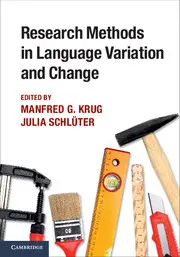Companion website for
Research Methods in Language Variation and Change
Research Methods

Cambridge University Press Online Catalogue
Edited by Manfred Krug and Julia Schlüter. Cambridge University Press 2013.
About the book
Research Methods in Language Variation and Change is a collective volume dealing with various methodologies in the field of empirical linguistics. The different chapters offer detailed insight into the diverse spectrum of empirical research methods currently applied in the field of language variation and change and aim to supply the reader with the necessary methodological know-how to independently conduct scientific empirical studies.
About the website
The companion website was established in connection with several advanced linguistics courses, in the scope of which students of the Universities of Bamberg and Regensburg conceived draft pages corresponding with the book’s respective chapters.
For each book chapter, this site provides a variety of
- summaries,
- background information,
- further resources,
- exercises,
- hands-on activities,
- sample material for case studies,
- illustrations of mini-projects and
- web links.
Table of Contents
Part 1.1 Fieldwork and linguistic mapping
1. Collecting ethnographic and sociolinguistic data
Daniel Schreier (Zurich)
2. Using participant observation and social network analysis
Lynn Clark (Christchurch) & Graeme Trousdale (Edinburgh)
3. Mapping linguistic variation
William A. Kretzschmar, Jr. (Athens, Georgia)
Part 1.2 Eliciting linguistic data
4. Designing and conducting interviews and questionnaires
Manfred Krug & Katrin Sell (Bamberg)
5. Obtaining introspective acceptability judgements
Thomas Hoffmann (Osnabrück)
Part 1.3 Alternatives to standard reference corpora
6. Using historical literature databases as corpora
Julia Schlüter (Bamberg)
7. Using the OED quotations database as a diachronic corpus
Günter Rohdenburg (Paderborn)
8. Using web-based data for the study of global English
Marianne Hundt (Zurich)
Part 2.1 Corpus analysis
9. Using "small" corpora to document ongoing grammatical change
Christian Mair (Freiburg)
10. Using tag sequences to retrieve grammatical structures
Sebastian Hoffmann (Trier)
11. Categorizing syntactic constructions in a corpus
Nicholas Smith (Salford) & Elena Seoane (Vigo)
Part 2.2 Phonetic and phonological analysis
12. Analysing phonetic and phonological variation on the segmental level
Ulrike Gut (Münster)
13. Analysing phonetic and phonological variation on the suprasegmental level
Ulrike Gut (Münster)
14. Reconstructing stress in Old and Middle English
Donka Minkova (Los Angeles)
Part 2.3 Combinations of multiple types of data
15. Combining elicitation data with corpus data
Anette Rosenbach (Paderborn)
16. Using convergent evidence from psycholinguistics and usage
Marilyn Ford (Griffith University) & Joan Bresnan (Stanford)
17. Applying typological methods in dialectology (work in progress)
Lieselotte Anderwald (Kiel) & Bernd Kortmann (Freiburg)
Part 3.1 Basic statistical analysis
18. Quantifying variation and estimating the effects of sample size on the frequencies of linguistic variables
Heikki Mannila (Aalto), Terttu Nevalainen & Helena Raumolin-Brunberg (Helsinki)
19. Elementary statistical testing with R
Stefan Th. Gries (Santa Barbara)
Part 3.2 Multifactorial analysis
20. Analysing and interpreting variation in the Sociolinguistic tradition
Sali A. Tagliamonte (Toronto)
21. Identifying multi-dimensional patterns of variation across registers
Douglas Biber & Bethany Gray (Flagstaff)
22. Computing linguistic distances between varieties
April McMahon (Aberystwyth) & Warren Maguire (Edinburgh)
23. Analysing aggregated linguistic data
Benedikt Szmrecsanyi (Freiburg)